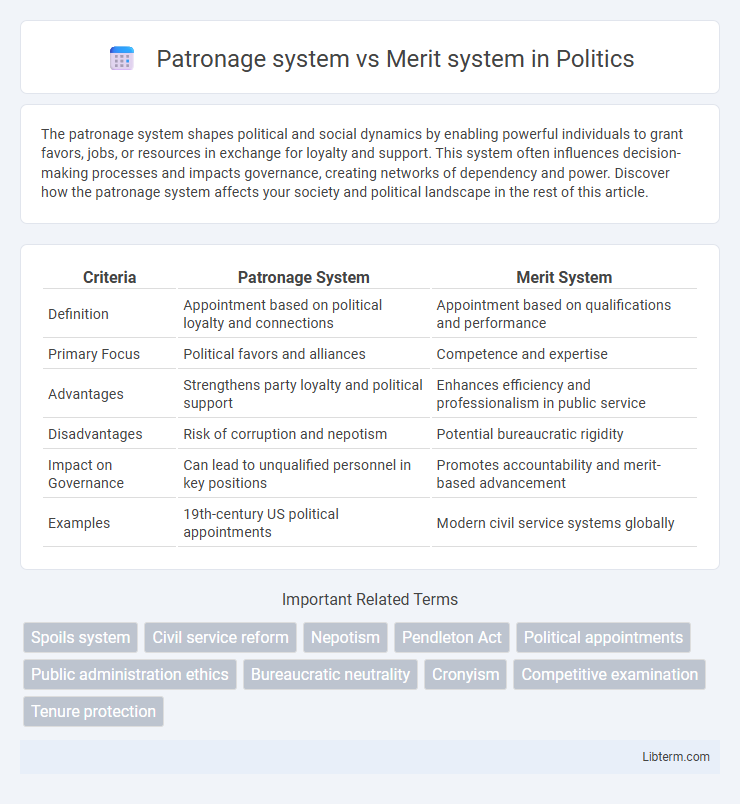The patronage system shapes political and social dynamics by enabling powerful individuals to grant favors, jobs, or resources in exchange for loyalty and support. This system often influences decision-making processes and impacts governance, creating networks of dependency and power. Discover how the patronage system affects your society and political landscape in the rest of this article.
Table of Comparison
| Criteria | Patronage System | Merit System |
|---|---|---|
| Definition | Appointment based on political loyalty and connections | Appointment based on qualifications and performance |
| Primary Focus | Political favors and alliances | Competence and expertise |
| Advantages | Strengthens party loyalty and political support | Enhances efficiency and professionalism in public service |
| Disadvantages | Risk of corruption and nepotism | Potential bureaucratic rigidity |
| Impact on Governance | Can lead to unqualified personnel in key positions | Promotes accountability and merit-based advancement |
| Examples | 19th-century US political appointments | Modern civil service systems globally |
Introduction to Patronage and Merit Systems
The patronage system involves awarding government jobs and favors based on political loyalty and relationships rather than qualifications. In contrast, the merit system bases hiring and promotions on individual competence, skills, and performance assessments. These systems fundamentally shape public administration by influencing fairness, efficiency, and accountability in government employment.
Historical Background of Patronage and Merit Systems
The patronage system, rooted in ancient civilizations such as Greece and Rome, flourished during the 18th and 19th centuries as a political practice rewarding loyalty with government jobs. In contrast, the merit system originated during the late 19th century civil service reforms like the Pendleton Act of 1883 in the United States, emphasizing qualifications and competitive exams for public positions. These systems reflect divergent philosophies: patronage prioritizes political allegiance, while merit champions competence and fairness in public administration.
Core Principles of the Patronage System
The Patronage System centers on appointing government officials based on loyalty and political support rather than qualifications or competence, emphasizing personal relationships and reciprocal favors. This system fosters political allegiance by rewarding supporters with public office positions, often compromising efficiency and integrity within institutions. Core principles include favoritism, nepotism, and the exchange of jobs for partisan loyalty, contrasting sharply with merit-based hiring that prioritizes skills and performance.
Core Principles of the Merit System
The core principles of the merit system prioritize hiring and promotion based on qualifications, skills, and performance rather than political affiliations or personal connections, ensuring fairness and competence in public service. This system emphasizes objective evaluation through competitive examinations, transparent selection processes, and protection from arbitrary dismissal to foster accountability and professionalism. By promoting equality of opportunity and rewarding merit, the merit system enhances efficiency, integrity, and public trust in governmental institutions.
Advantages of the Patronage System
The patronage system fosters strong loyalty and political support by rewarding close allies with government positions, enhancing unity within ruling parties. It allows for rapid staffing of public offices without lengthy qualifications assessments, facilitating swift administrative control. This system often ensures that officeholders are deeply committed to the leader's agenda, promoting cohesive policy implementation.
Advantages of the Merit System
The Merit System enhances government efficiency by promoting qualified candidates based on skills and performance rather than political connections, ensuring competent public service delivery. It reduces corruption and favoritism, fostering transparency and accountability within administrative processes. By rewarding merit, it motivates employees to improve their expertise and productivity, cultivating a professional and motivated workforce.
Disadvantages and Criticisms of the Patronage System
The patronage system often leads to inefficiency and corruption as government positions are awarded based on loyalty rather than qualifications, undermining meritocracy. This practice fosters nepotism, reduces accountability, and decreases public trust in institutions. Moreover, it can perpetuate inequality by limiting opportunities for skilled individuals outside the patronage network.
Disadvantages and Criticisms of the Merit System
The merit system faces criticism for fostering excessive bureaucracy and rigid procedures that can stifle innovation and adaptability within organizations. It may also lead to an overemphasis on standardized testing and formal qualifications, potentially overlooking practical skills and diverse talents. Critics argue that the merit system can inadvertently perpetuate inequality by favoring candidates with greater access to education and resources.
Real-World Examples and Case Studies
The patronage system, exemplified by the spoils system in 19th-century U.S. politics, often led to corruption and inefficiency by awarding government positions based on loyalty rather than competence. In contrast, Singapore's meritocratic civil service, established in the 1960s, prioritizes qualifications and performance, contributing to the country's rapid economic development and administrative excellence. Case studies of Indian bureaucracy reforms show gradual shifts from patronage-based appointments to merit-based selections aimed at reducing nepotism and enhancing governance quality.
Conclusion: Choosing Between Patronage and Merit Systems
Selecting between patronage and merit systems hinges on prioritizing either political loyalty or competence in public service. Patronage systems may foster political stability through loyal appointments but risk inefficiency and corruption. Merit systems promote fairness and expertise, enhancing government performance and accountability.
Patronage system Infographic

 libterm.com
libterm.com